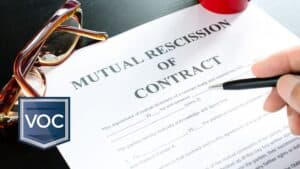At face value, a timeshare seems like a great idea. You and your loved ones get guaranteed space at an exclusive resort without the headaches or expenses of owning a vacation home. You can anticipate an enjoyable couple of weeks at your annual getaway.
Unfortunately, once the fractional ownership contracts have been signed, many people have a different experience. The timeshare industry is full of high-pressure salespeople, failed expectations, and downright scams. It’s no wonder many timeshare owners are looking for ways to sell or otherwise end their contracts. In this article, we’ll look at the top 10 reasons people want to get away from fractional property ownership.
1. Buyer’s Remorse: Regret after High-Pressure Sales
One of the most common reasons timeshare owners seek to exit their contracts is the regret that often follows a high-pressure sales experience. High-pressure sales tactics are notorious in the timeshare industry. Prospective buyers are frequently subjected to lengthy presentations and relentless pitches where a promise of a 90-minute pitch stretches to several hours.
At the same time, timeshare companies employ salespeople trained to create a sense of urgency and excitement. The atmosphere makes consumers feel like they’re exclusive deal will soon disappear if they don’t act immediately. In fact, presenters may tell customers that if they leave to go over the contract with a lawyer, they will miss out on the today-only deal offered at the presentation. The whole affair gets people to lower their guard and sign a one-sided agreement that benefits the timeshare company.
Sales representatives may use tactics such as offering complimentary stays, free meals, special prizes, or other incentives just for attending the presentation. These tactics can make the offer seem too good to pass up, especially when combined with the persuasive skills of experienced salespeople. The pressure to sign on the spot can be overwhelming. Prospective buyers have little time to read the contract thoroughly or consider its long-term implications.
Unfortunately, once the high-pressure environment has dissipated and new owners have had time to reflect, many begin to experience buyer’s remorse. They realize they made a significant financial commitment without fully understanding the costs and responsibilities involved. This regret is a powerful motivator for owners to seek ways to exit their timeshare contracts and regain their financial freedom.
2. Misrepresentation and Fraud
Timeshare companies have a reputation for stretching the truth to make a sale. They hope the challenges of walking away from a contract will discourage clients from doing so after they sign up. Timeshare presentations often misrepresent the relationship of fractional owners to the resort, the available timeshare inventory, and the ease of exiting the contract.
For example, a timeshare presentation might offer a tour of the most luxurious parts of a resort, implying that these four-star accommodations are part of the timeshare inventory. In reality, the timeshare contract only offers less desirable accommodations or space at a separate resort property altogether. The fractional owners may not realize this bait-and-switch until long after the contract has been signed.
Because of the reputation of the timeshare industry, salespeople often misrepresent the ease of exiting the contract. Potential buyers are told about the possibilities of rental income or resale value that will never come to pass. The salesperson may even offer a personal contact number in case they want to cancel. It’s not unusual for owners to hear an automated message informing them that the number is no longer in service. By this time, the window for canceling has passed, and the sales representative has secured their commission check.
Even worse than misrepresentation is fraud, with buyers being sold timeshare inventory that doesn’t exist or are completely different from what was promised. This deceit can leave owners feeling trapped in worthless contracts with no recourse for recovering their failed investment. The frustration and financial loss resulting from these deceptive practices drive many to seek legal avenues to exit their contracts.
3. Limited Resort Availability
One of the common criticisms of the timeshare concept is that people like to have variety. New timeshare models offer space at several resorts in beautiful locations and paint a vast array of availability that owners discover to be too good to be true after the purchase.
The sales pitch may promise destinations that are not in their inventory or misrepresent their point value strength in third-party exchange platforms. During the presentation, sales representatives will suggest that 100% of the inventory through timeshare exchange companies like Resorts Condominiums International and Interval International, is available to timeshare owners. However, most entry-level contracts only grant access to a small fraction of the inventory.
When customers complain, they are almost always told to spend more to solve their problem. They are led to believe that by upgrading their contract, it will open new possibilities. These upgrades also add tens of thousands of dollars in expenses. Yet, the resort they truly want is almost always out of reach so they continue to pay for upgrades. This exploitive model explains why 50% of annual timeshare sales come from upgrades in a company’s existing owner base.
4. Rental Limitations and Lack of Resale Value
Many timeshare buyers are initially enticed by the prospect of a fractional property as a long-term investment. They hope to offset their costs through renting out their timeshare during periods when they can’t use it. Sales presentations often highlight this potential income stream as a key benefit, making ownership seem more financially viable. However, once they sign the contract, owners often discover numerous restrictions and challenges to renting out their timeshare.
Some timeshare agreements explicitly prohibit or severely limit renting out the unit. These contractual clauses can come as an unpleasant surprise to owners who had planned on rental income to help cover their expenses.
Other timeshare owners are persuaded to purchase with the goal of selling their contract when they’re done. At some timeshare presentations, salespeople talk about owner buyback programs that may not exist. Buyers are often led to believe their timeshare will retain or even increase in value over time, similar to traditional real estate. However, the reality is starkly different. Timeshares are notorious for their poor resale value, often depreciating significantly the moment they’re purchased.
One reason for this drastic depreciation is that there are far more timeshares available for resale than there are interested buyers. This imbalance drives down prices, making it difficult for owners to sell their units for anywhere near the original purchase price. In many cases, owners can only sell their timeshares for a fraction of what they initially paid. They may also discover that they cannot sell it at all.
The stark contrast between the expected and actual resale value leaves many timeshare owners feeling trapped in a liability that drains their finances without providing the anticipated returns. This frustration and financial burden lead owners to seek professional assistance in exiting their contracts. They hope to cut their losses and move on from the disappointing investment.
5. Financial Obligations
From the start, many timeshare owners don’t fully understand the financial obligations that come with their contracts. The unexpected costs of owning a timeshare are a common reason people want to leave it.
Timeshare mortgages are often financed by a subsidiary of the timeshare developer at high interest rates, typically ranging from 15% to 17.99% or the maximum rate allowed by the state. These loans usually have a 10-year term, which means the total cost at maturity can more than double the initial purchase price. The high interest rates and long terms make these mortgages a significant financial burden.
Maintenance fees are a regular financial obligation for timeshare owners, typically billed annually. However, the billing frequency can vary depending on the ownership type. These fees increase annually and must be paid regardless of whether the owner uses the timeshare.
Third-party financing often comes into play during new purchases or upgrades. Timeshare developers have partnerships with banks like Comenity Bank, Barclays Bank, AMEX, and Citizen’s Pay to offer branded credit cards. Owners may unknowingly apply for these credit cards. Then, the company uses the account to finance down payments and set up auto-debits for mortgages and maintenance fees. Down payments can range from $3,000 to $5,000, but some timeshare companies might charge the full amount on the credit card if the credit limit allows.
6. Unexpected Special Assessment Fees
Special assessment fees are separate from regular maintenance fees but are also mandatory for timeshare owners. These unexpected bills can arrive for various reasons, often leaving owners financially unprepared. Common reasons for special assessment fees include resort renovations or upgrades and offsetting the cost of delinquent payments. Other fees may help the developer deal with unexpected losses such as lower income during the COVID-19 pandemic.
In many timeshare contracts, resorts can pass almost any additional expenses incurred by the resort back to the owners. This unpredictability and potential for high costs add another layer of financial risk and stress for timeshare owners, making these fees a significant reason to reconsider continuing with a timeshare contract.
7. External Impacts
Several external factors can impact a fractional owner’s relationship with their resort. Changes in policy, resort closures, and other issues may leave owners wanting to get out of their contracts.
When larger companies acquire existing timeshare resorts, the new company typically aims to integrate owners into their updated vacation ownership programs. This often involves convincing owners to trade in their existing, often deeded, interests for new points-based programs. The transition usually comes with a significant cost and results in much higher maintenance fees.
Natural disasters, such as hurricanes in Florida and other beach destinations, can lead to significant damage and resort closures. During these times, timeshare companies still require owners to make their payments despite not being able to use their timeshares. They also face special assessment fees for repairs.
Similarly, the COVID-19 pandemic closed many resorts for over a year. However, most timeshare companies continued to demand payments from owners, who could not access the properties. This led to widespread dissatisfaction and numerous complaints from owners who felt they were not provided with any relief or remedies during the pandemic.
The timeshare industry invests heavily in lobbying efforts to push through legislation that often favors developers over owners. Proposed bills typically seek to remove caps on maintenance fee increases and limit the resources available to owners who wish to exit their contracts. These legislative changes can lead to increased financial burdens for timeshare owners. They can also restrict their ability to seek relief from unfavorable contracts.
8. Poor Property Management
Many timeshare resorts built in the late 1900s and early 2000s suffer from poor property management. These resorts often have not been remodeled or properly maintained, leading to outdated and undesirable accommodations. The lack of renovations and repairs significantly detracts from the overall experience, making it less appealing for owners to use their timeshares.
Ailing resorts frequently struggle with an aging client base and a lack of active sales centers to resell delinquent inventory. Without the ability to sell or manage this inventory effectively, these resorts lack the necessary resources to maintain and improve their properties. This cycle of neglect further degrades the quality of the resorts, exacerbating the problem.
9. Unwanted Inheritance
As the first generation of timeshare owners starts to pass away, their children might be saddled with deeds to fractional properties they’re not interested in keeping. Issues mentioned above such as a low resale value, assessment and maintenance fees, and rental restrictions can make the inheritance an unexpected burden. Additionally, the timeshare might be tied to a property that is outdated or poorly managed, making it even less desirable.
Heirs may find themselves walking awkwardly into the timeshare industry in which they have little experience. In some cases, attempts to sell back a deed have resulted in companies transferring it to a point ownership contract. This switch still leaves the owners dealing with a timeshare they didn’t want in the first place.
10. Lifestyle Changes
Some of the most frequent reasons for exiting a timeshare involve changes in lifestyle, with age being a primary concern. The resort someone enjoyed with their children in their 40s may not be the right choice as they pass retirement age. Yet, the resort will continue to request maintenance fees and other expenses whether they use their weeks or not.
Similarly, changes such as divorce or the loss of a spouse can also affect an owner’s priorities. An owner may not be able to afford the expense of a timeshare on a single income. They may also not want to keep returning to a place they associate with their previous relationship.
Professional changes are another reason to consider leaving a timeshare. A new profession may not have the same flexibility for vacation weeks, making it difficult to access the property. No one wants to be obligated to a vacation property they can’t use.
Are you dealing with any of our top 10 reasons for leaving your fractional ownership property? Don’t let your timeshare be a burden. A timeshare cancellation company can offer a range of options to help you navigate the timeshare industry, helping you regain control of your financial future. With the assistance of knowledgeable experts, you can bid farewell to the timeshare season for good and move towards a more secure and stress-free life.






